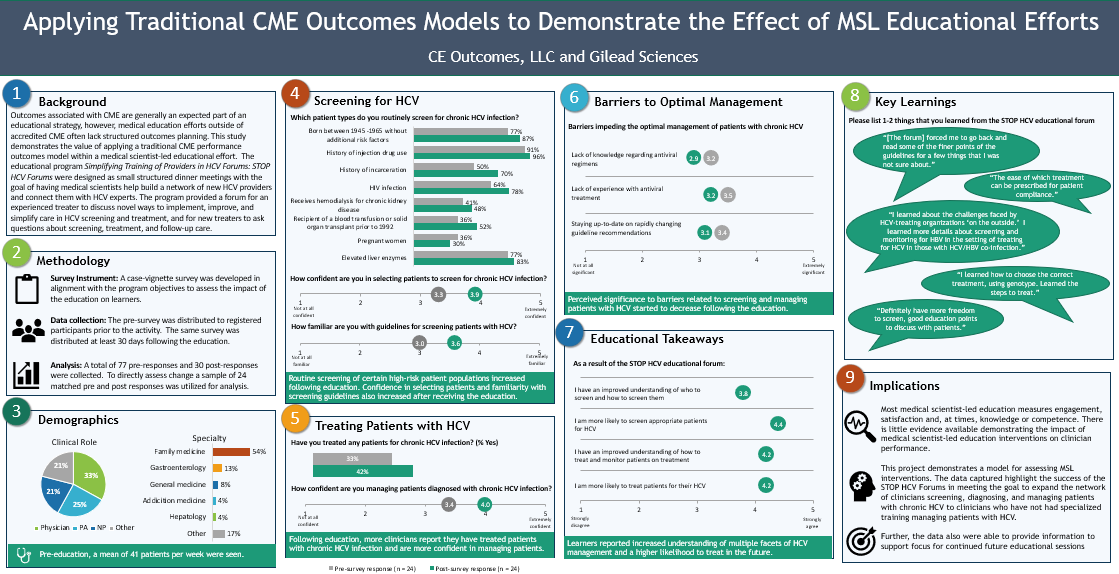By Wendy Cerenzia1, Brandon Coleman1, Kyle Hammond2
- CE Outcomes, LLC; Birmingham, AL
- Gilead Sciences; Foster City, CA
Outcomes associated with continuing medical educational (CME) activities have evolved to be an expected component of an educational strategy. However, educational efforts directed to clinicians, outside of accredited CME, such as disease state awareness campaigns led by medical science liaisons (MSLs), have often lacked structured outcomes models that are typically associated with CME. This study demonstrates the value of applying a traditional CME performance outcome assessment model within a MSL-led educational outreach.
Educational Program Overview and Goal
The educational program Simplifying Training of Providers in HCV Forums: STOP HCV Forums was designed as small structured dinner meetings targeting clinicians involved in the screening and diagnosis of chronic hepatitis C infection. The goal of the education was for MSLs to build a network of new HCV providers and connect them with HCV experts. This education was particularly targeted within a defined region in need of expanding screening, linkage and treatment of patients with HCV. The program provided a forum (eg, dinner discussion) for an experienced treater to discuss novel ways to implement, improve and simplify care in HCV screening and treatment, and for new treaters to ask questions about screening, treatment and follow-up care of HCV.
Outcomes Objective and Design
Based on the goals of the program, the outcomes plan was designed to understand the impact of the education on clinical practice as well as behavioral and attitudinal changes associated with education. In order to assess clinical practice change associated with the STOP HCV Forums, outcomes were designed to achieve Level 5: Performance[1] via a pre- vs. 30-day follow-up survey.
To accomplish this, a pre-survey was distributed to registered forum participants approximately one week prior to educational intervention. The same survey was distributed at least 30 days following the education. Neither the pre- nor the follow-up surveys included an honorarium for participants. Comparisons were made to determine clinical practice changes, as well as changes to attitudes and perceived barriers following exposure to the education and return to clinical practice.
The STOP HCV Forums included in this assessment took place over Q2 and Q3 2019. A total of 77 pre-surveys and 30 post-surveys were received. In order to directly compare to assess change, pre- and follow-up respondents were matched, and a sample of 24 responses was utilized for analysis.
Key Outcomes Results
Figure 1 demonstrates the key findings of the assessment study including:
- A higher percentage of learners reporting screening for HCV among high-risk populations following the education
- Decreased perceived significance to barriers related to screening and managing patients with HCV following the education
- Increased understanding of multiple facets of HCV management and a higher likelihood to treat in the future

Historically, there have been a limited number of specialized providers who have diagnosed and managed patients with chronic HCV due complicated testing for diagnosis and burdensome treatment regimens. Given changes in screening and treatment guidelines and the emergence of less complicated and burdensome treatment regimens, there is an opportunity to increase the population of clinicians who could be screening and managing patients with HCV. The educational activity STOP HCV Forums sought to connect clinicians, including primary care physicians, nurse practitioners and physician assistants, with expert perspectives in order to expand the network of clinicians screening, diagnosing and managing patients with chronic HCV.
The team of MSLs leading these educational efforts had not previously engaged in a performance-level outcomes assessment of education. Given that, it was important to gain buy-in and ensure an understanding of the value of implementing and gathering higher-level outcomes data. An internal champion helped to convey the importance of a performance level assessment and the value of investing time and efforts to capturing the outcomes data needed to show the impact of the education.
In addition to having a champion, it was key to communicate closely with the full team of MSLs organizing the individual STOP HCV Forums to ensure success of the outcomes assessment. It was important to the MSLs that the time for the STOP HCV Forum be utilized for the expert interaction and educational content, therefore the completion of the pre-survey ahead of the education and post-survey outside of the educational session allowed for the scheduled educational time to be fully dedicated to the content.
The data from this assessment provided the opportunity for the MSL team to demonstrate the impact of their efforts on achieving their educational goals and impacting clinical practice. Further, the data also was able to provide information to support focus for continued future educational sessions.
Future improvements
For future studies, one area for improvement would be to continue efforts to increase the response rate of the follow-up survey. The follow-up survey is crucial to assess how clinicians are putting the education into practice, but it leads to significant drop-off of responses as compared to what could be gathered within the context of the educational activity. Potential solutions for increasing post-survey response rates include providing a small honorarium for participation or considering alternative survey distribution outlets, such as text message delivery.
Summary
This study demonstrates the value of applying higher-level outcomes methodology that has long been a staple within traditional CME to clinician education directed by MSLs. While the MSLs involved had less experience implementing higher-level outcomes, they embraced the efforts as they recognized the power of being able to demonstrate the impact of the education on practice and in alignment with the overall learning objectives, as well as obtain data to guide future. The results demonstrated that learners had improved understanding of who to screen, were more likely to screen specific high-risk populations for HCV and were more confident in managing patients diagnosed with HCV thus achieving the goals of the educational efforts.
Reference
1. Moore DE Jr, Green JS, Gallis HA. Achieving desired results and improved outcomes: integrating planning and assessment throughout learning activities. J Contin Educ Health Prof. 2009 Winter;29(1):1-15.